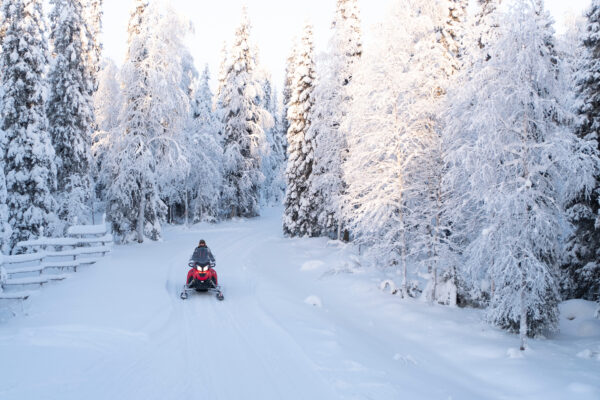
Are snowmobiles dangerous? Are there dangers and risks with snowmobiles and snowmobiling? Snowmobiling enthusiasts and legal experts alike have long asked such questions over the years, and the short answer is “Yes.” To an extent, few would argue that there are no risks or dangers involved with snowmobiling. Snowmobile accidents happen. Every winter season, people are seriously hurt or, sadly, killed as a result of a snowmobile accident. The key to prevent a snowmobile accident from happening is to understand the risks associated with snowmobiling and minimize them.
To be clear, the dangers that do exist with snowmobiles are not with the snowmobile itself but factors associated with snowmobiling. Snowmobiling through the Woods of Maine is an exciting and enjoyable winter activity for many people. It’s a lot of fun. However, a snowmobile is a machine, after all. It is a powerful motorized sled designed to operate at high speeds over snow-covered terrain in exceptionally harsh conditions.
People driving and riding snowmobiles should be aware of the potential dangers and risks of injury that result from, or are associated with, snowmobiles and snowmobiling. To ensure your safety and the safety of others while out on the trails, here are a few factors to minimize risk when enjoying this fun winter activity.
Dangers of High-Speed
In Maine, it is against the law to operate a snowmobile “… in a manner that fails to control its speed at all times…” to avoid collision with any person, another snowmobile or vehicle, or any object. High speed is a leading cause of injuries and accidents while snowmobiling. These days snowmobiles can top out upwards of 90 to 120 mph on average. That’s fast enough to seriously harm someone in a collision if a driver misjudges a curve or any obstacles on the trail. At high speeds, reaction time is slowed. Because snowmobiles are not equipped with roll bars or seat belts, drivers and passengers can easily be thrown off and injured in the event of a collision, especially if they’re traveling at high speeds.To ensure a safe ride for all, never drive at reckless speeds and be aware of your surroundings and terrain before accelerating through a forest or clearing.
Driving Under the Influence
The use of alcohol or drugs while snowmobiling not only impairs judgment, coordination, and reaction times, which significantly increases the risk of accidents, but it is against the law to drive a snowmobile under the influence of either. If a snowmobiler is impaired, they can face legal penalties, including substantial fines and potential criminal charges. Never operate a snowmobile while under the influence of alcohol or drugs.
Weather Conditions
Even for snowmobilers, winter weather conditions can sometimes be hazardous. Out on the trails, drivers and passengers are constantly exposed to the elements, which can include extreme cold, wind and windchill, and heavy snowfall. Exposure to harsh weather conditions can lead to frostbite, hypothermia, and other cold-related injuries if riders are not adequately prepared with appropriate clothing and gear. Weather conditions can also interfere with visibility, which could lead to an accident. In low-visibility conditions, such as heavy snowfall or fog, it can be challenging to see obstacles, other riders, or potential hazards on the trail. Always check weather conditions and be aware of weather forecasts. For safety sake, avoid riding in severe conditions.
Inexperienced Drivers
Learning how to operate and handle a snowmobile safely is essential for all riders of any age. Inexperienced drivers often lack the skills and knowledge needed to operate a snowmobile safely, which can lead to poor decision-making that results in accidents. Inexperienced riders may overestimate their skills or the capabilities of their snowmobiles, leading them to take unnecessary risks or attempt to traverse terrain beyond their abilities. Age is also a factor in experience. Though Maine has few age restrictions for driving snowmobiles, children between the ages of 10 and 14 can only operate a snowmobile on their own property. They cannot drive on or across “public ways,” i.e, any state highway, municipal or county road, or even unincorporated territory roads.
Safety Gear
Wearing appropriate safety and protective gear can reduce the risk of injury in the event of an accident or exposure to sudden inclement weather conditions. Drivers and riders should always wear safety gear, including helmets, goggles or a visor, insulated clothing, gloves, and boots. Helmet visors or face shields will protect your face from the blinding glare of the sun and flying debris. On cold or snowy days, dress in layers to stay warm and dry.
For many Mainers, snowmobiling is a great winter pastime to enjoy with family and friends. However, everyone who hits the trails should be aware of the potential dangers and risks associated with snowmobiling. People should not be operating a snowmobile at excessive speed while intoxicated or without experience.
Contact Maine’s Injury Lawyers for the Best Results
If you are injured snowmobiling as a result of such negligence, then you have a legal right to fair compensation to cover medical bills, lost wages, and any damages. If you have been injured in a snowmobile-related accident, contact Hardy Wolf & Downing for a free consultation with one of our experienced lawyers in recreational liability and personal injury law. We will work for you to ensure you receive the just compensation you deserve for your injuries.

